| Listing 1 - 10 of 592 | << page >> |
Sort by
|

ISBN: 0815784554 Year: 2000 Publisher: Washington (D.C.) Brookings Institution Press
Abstract | Keywords | Export | Availability | Bookmark
 Loading...
Loading...Choose an application
- Reference Manager
- EndNote
- RefWorks (Direct export to RefWorks)
Book
ISBN: 1283379724 9786613379726 140084164X 0691154082 Year: 2012 Publisher: Princeton Princeton University Press
Abstract | Keywords | Export | Availability | Bookmark
 Loading...
Loading...Choose an application
- Reference Manager
- EndNote
- RefWorks (Direct export to RefWorks)
How to Win an Election is an ancient Roman guide for campaigning that is as up-to-date as tomorrow's headlines. In 64 BC when idealist Marcus Cicero, Rome's greatest orator, ran for consul (the highest office in the Republic), his practical brother Quintus decided he needed some no-nonsense advice on running a successful campaign. What follows in his short letter are timeless bits of political wisdom, from the importance of promising everything to everybody and reminding voters about the sexual scandals of your opponents to being a chameleon, putting on a good show for the masses, and constantly surrounding yourself with rabid supporters. Presented here in a lively and colorful new translation, with the Latin text on facing pages, this unashamedly pragmatic primer on the humble art of personal politicking is dead-on (Cicero won)--and as relevant today as when it was written. A little-known classic in the spirit of Machiavelli's Prince, How to Win an Election is required reading for politicians and everyone who enjoys watching them try to manipulate their way into office.
Book
ISBN: 8362453869 Year: 2014 Publisher: Warsaw : Polski Instytut Spraw Międzynarodowych,
Abstract | Keywords | Export | Availability | Bookmark
 Loading...
Loading...Choose an application
- Reference Manager
- EndNote
- RefWorks (Direct export to RefWorks)
On 13 March 2014 in Warsaw, the Polish Institute of International Affairs (PISM) in cooperation with the Korea Foundation, Ministry of Foreign Affairs of the Republic of Poland, Northeast Asian History Foundation and Korean Embassy in Warsaw organised the international seminar “Polish Experience in Reconciliation: A Model for Rapprochement in East Asia?” The meeting aimed at fostering discussion among Korean, Polish and German experts about the applicability of the Polish and European experiences and mechanisms in reconciliation in East Asia. Special attention was paid to Korean–Japanese relations. About 60 government officials, experts, and scholars attended the seminar.
Book
ISBN: 0256023220 Year: 1980 Publisher: Homewood (Ill.) : Dorsey press,
Abstract | Keywords | Export | Availability | Bookmark
 Loading...
Loading...Choose an application
- Reference Manager
- EndNote
- RefWorks (Direct export to RefWorks)
Political campaigns --- Presidents --- Election
Book
ISBN: 0669017825 Year: 1978 Publisher: Lexington (Mass.) : Heath,
Abstract | Keywords | Export | Availability | Bookmark
 Loading...
Loading...Choose an application
- Reference Manager
- EndNote
- RefWorks (Direct export to RefWorks)
Book
ISBN: 9780700618590 9780700618606 Year: 2012 Publisher: Lawrence (Kan.) : University Press of Kansas,
Abstract | Keywords | Export | Availability | Bookmark
 Loading...
Loading...Choose an application
- Reference Manager
- EndNote
- RefWorks (Direct export to RefWorks)
Political campaigns --- Presidents --- History
Book
ISBN: 1009264877 1009264893 1009264869 1009379240 9781009264877 9781009264891 9781009264860 Year: 2023 Publisher: Cambridge, England : Cambridge University Press,
Abstract | Keywords | Export | Availability | Bookmark
 Loading...
Loading...Choose an application
- Reference Manager
- EndNote
- RefWorks (Direct export to RefWorks)
This element examines congressional party election agendas, asking first how they originate and what priorities within the party they strategically represent and, second, how they shape post-election legislative activity and policymaking.
Political campaigns --- Campaign promises --- History. --- United States. --- Elections. --- Political campaigns.
Book
Abstract | Keywords | Export | Availability | Bookmark
 Loading...
Loading...Choose an application
- Reference Manager
- EndNote
- RefWorks (Direct export to RefWorks)
Political campaigns --- Elections. --- Political campaigns. --- Germany (West). --- Elections
Book
ISBN: 1316310965 1316212785 1316290336 1107102898 1107501164 9781316290330 9781316310960 9781316212783 Year: 2015 Publisher: Cambridge : Cambridge University Press,
Abstract | Keywords | Export | Availability | Bookmark
 Loading...
Loading...Choose an application
- Reference Manager
- EndNote
- RefWorks (Direct export to RefWorks)
Hacking the Electorate is the most comprehensive study to date about the consequences of campaigns using microtargeting databases to mobilize voters in elections. Eitan Hersh follows the trail from data to strategy to outcomes. Hersh argues that most of what campaigns know about voters comes from a core set of public records. States vary in the kinds of records they collect from voters - and these variations in data across the country mean that campaigns perceive voters differently in different areas. Consequently, the strategies of campaigns and the coalitions of voters who are mobilized fluctuate across the country because of the different ways campaigns perceive the electorate. Data policies influence campaigns, voters and, increasingly, public officials.

ISBN: 0814273009 0814209432 0814257089 Year: 2004 Publisher: Columbus : Ohio State University Press,
Abstract | Keywords | Export | Availability | Bookmark
 Loading...
Loading...Choose an application
- Reference Manager
- EndNote
- RefWorks (Direct export to RefWorks)
| Listing 1 - 10 of 592 | << page >> |
Sort by
|

 Search
Search Feedback
Feedback About UniCat
About UniCat  Help
Help News
News